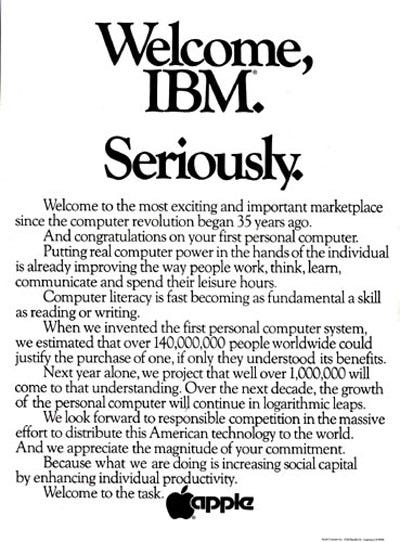It’s 100 years today since the ‘Computing-Tabulating-Recording Company’1 became known to the world as ‘International Business Machines’.2
IBM may not be the force it once was, but it’s hard to overstate the impact that the firm has had on the development of the computer systems that we use every day. From S/360 series mainframes to the IBM Personal Computer. From DRAM to the hard disk drive, from RISC to the relational database. And, more widely, the company has had a remarkable influence on the world we know today, some of it good, and some, of course, very bad.3
So to mark the occasion here is a short film by Errol Morris, made in 2010 to celebrate the centennial of the founding of the firm.
This IEEE Spectrum article has much more on the early days of CTR and IBM.
I couldn't help think of this moment in computing history from 1981. For a long time it looked as though IBM would ‘win’ in ‘personal computers’. Today the tables have turned again, and Apple is led by an ‘ex-IBMer’.
On a personal note, IBM gave me my first real job. I wasn’t there long, but it was surprisingly fun and I have very fond memories.
Do share your thoughts on IBM, past, present and future.
As a side note, it’s interesting to see the use of the word ‘computing’ used so prominently, decades before the modern computer was created.
Although C-T-R’s operations in Canada had been known as IBM since 1917.
https://en.wikipedia.org/wiki/IBM_and_the_Holocaust






Just talking to an old IBM mainframe guy originally from NY and for the last 30 years in Las Vegas.
My experience… I was working for an Apple dealership in Sydney and we were invited to become an IBM dealer. I got to see and learn about the 5150 a few months prior to release. This was my first experience with IBM as a company and I was in awe. I was amazed at how professional and organised everything was.
Love that I got to experience this
When I was 10 years old I wrote a letter to IBM. Don’t remember what it said, but I was intrigued by computers then and wanted to know more so they must have seemed like an obvious place to start.
To my eternal surprise, they wrote back and sent me two programming manuals for the IBM 5100: one for BASIC and one for APL. They didn’t have to do that, of course, but somewhere in that big corporate behemoth somebody took the time to reply to some random kid. APL was so intriguing. This made a huge impact on my choice to become a programmer. I didn’t have access to a 5100, of course, or any computer at all at that point; but that’s how APL became the first programming language I (book) learned. I didn’t get to work on an actual APL capable computer until college. By then I got an internship at Apple; and that put an end to that track.
So IBM (and APL) will always have a warm place in my heart :-)